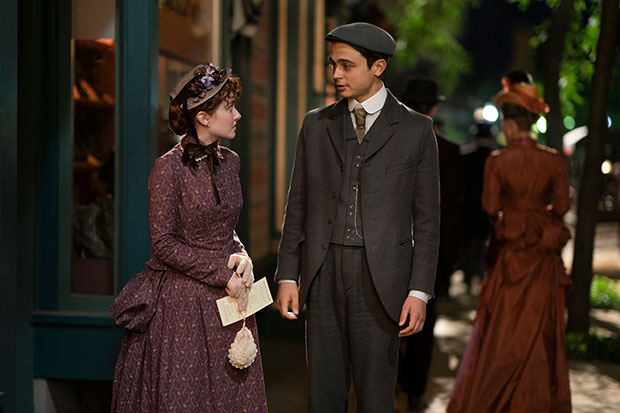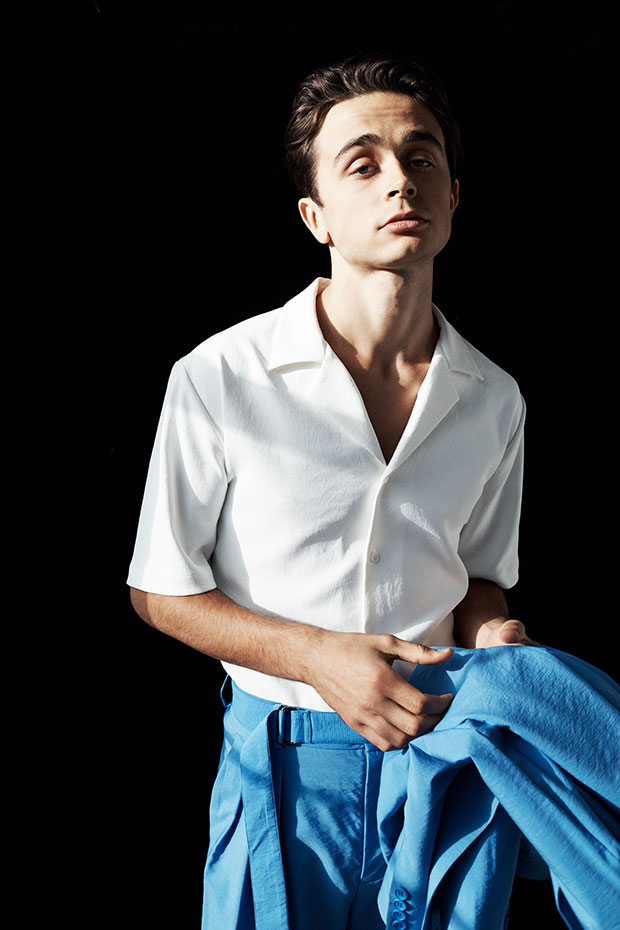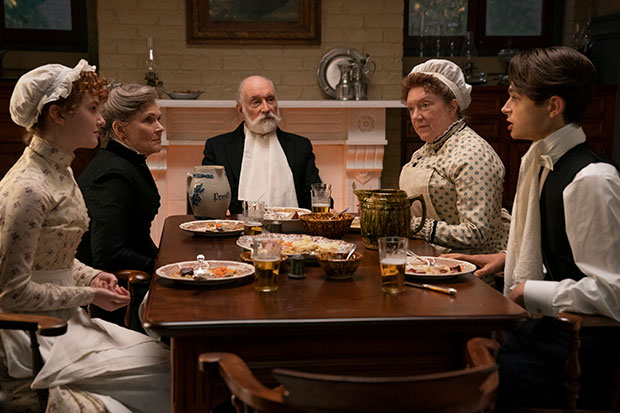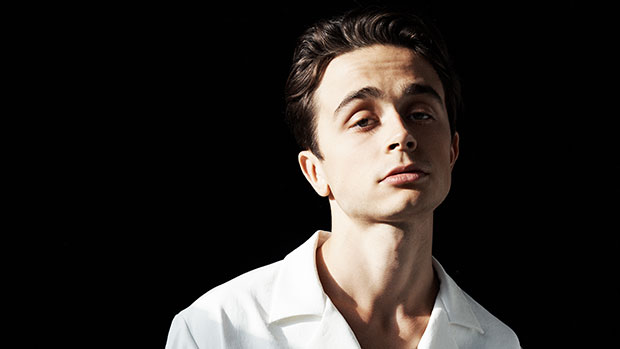Ben Ahlers of «The Gilded Age» Teases A «Rich Backstory» For Jack: He’s A «Radical Optimist.»
Jack appears in practically every scene in the Brook home. HL spoke with Ben Ahlers EXCLUSIVELY about Jack’s ambitions, working with ‘titans’ on TV and in real life, and more.
The Gilded Age occurs during a period of rapid change. As the century draws to a close, new opportunities emerge at every level of society. Ben Ahlers plays Jack Treacher, a footman at the Brook household, in the HBO series.
Ben chatted with HollywoodLife EXCLUSIVELY on Jack’s personal goals. He stated that Jack is attempting to «find his place» in the midst of all the change. We’ll understand where Jack’s «heart and brain» come from, according to the actor, who hinted at a «deep backstory» for him. Take a look at our Q&A below:

Ben Ahlers and Taylor Richardson as Jack and Bridget. (HBO)
What is Jack’s take on the new money vs. old money debate? Is there anything he thinks about Agnes working for him?
Ben Ahlers (BAHLER): I believe he does. For a while, they were constructing the mansion across the street. I’m sweeping in the first episode, and all I can see is this palace being erected to the sky. I’ve been staring at it every morning since I awoke. I believe there was a lot of change at this time.
I believe it’s a lot like youth today in this changing world of new media and new industries coming up all over the world, where he’s trying to best align himself, to find his position in that transition, since I didn’t have much of a stake in getting my station overrun by these railroad tycoons. Putting myself in his situation, if I were waking up every morning and looking across the street, I think it would be difficult for me to stay away from that potential.
Agnes is extremely old money, but then you see the new money and how anyone’s life may seem like.
Ben Ahlers: Without a doubt. The show brought me to New York, but New York is the epitome of that. It is constantly changing. Industries come and go, buildings come and go, and new opportunities emerge. I was born and raised in the borough of Brooklyn.
Given how far you may go and where a lot of these kids come from, having stability in any employment is the American ideal in and of itself, plus I have that dark Irish-Italian accent. But, during that moment, there’s really nothing else to do but wake up and try to orient yourself towards that potential if you want to find middle-class stability and build a life for yourself, especially as a young person.
Will we learn more about Jack’s backstory over the season?
Ben Ahlers (BAHLER): You’ll succeed. What makes Julian so amazing is that both Downton Abbey and The Gilded Age are so literary in the sense that they have these intertwining characters about whom you learn a lot even from just a few brief vignettes.
Jack has a complex past that I didn’t learn about until later in the season, so that was a challenge in and of itself. How do you come to know this person when, especially in TV writing, everything is constantly changing, and your performance as a character changes with the way the plot is tweaked? In the second part of the season, you gain a better understanding of where this kid’s heart and mind come from.

Ben Ahlers stars on ‘The Gilded Age’ as Jack Treacher.
Jack appears to have his eyes and ears open at all times. He has access to a great deal of information.
He’s this radical optimist, Ben Ahlers. This is a pragmatic optimist. But back then, especially as a footman, I spent a lot of time standing in the corner, pouring tea, and then watching these powerful people in the society having these debates.
My phone won’t let me check out. When I go to sleep, I don’t have much to do except stew, ponder, dream, and do all of that. He’s a sponge in that way, I believe, just by being exposed to the heights of the individuals he works for.
Perhaps he’s a secret carrier…
Ben Ahlers: That’s how we got together. That’s your family, the downstairs crew, and we really pounded this home in rehearsals. You reside in that area. The butler, Mr. Bannister, is like a father figure to me. Bridget is a close friend and confidante of mine. Gossip regarding the Astor clan of New York City’s to-dos… Please, don’t make me laugh. It’s preferable to reading about it in a magazine.
Do you believe Jack yearns for anything greater than the life he now has?
Ben Ahlers (BAHLER): Later in the season, when you learn more about his background, you’ll notice that he has a strong sense of independence and a continual desire to make something of his life. I believe that simply being in the presence of these role models, these standards of great status and power, and all of that, instill in you.
Even when I was on set with Christine Baranski and Cynthia Nixon, you can see that. Don’t even get me started on that subject. That was a two-month period of solely preparing myself for the day I came onto set. But when you see these titans of your field, it makes you want to be more like them, especially when you’re an equal participant in the process. In that way, I definitely felt a connection with Jack.
Agnes is unbreakable. She is quite rigorous and firm in her convictions. Is she ever going to give up? I don’t want to get into a brawl with her.
Ben Ahlers (BAHLER): She has a set of values that she adheres to. Whether or not you agree with her value system, there are risks and repercussions to embodying and expressing them as openly and plainly as she does. You must respect it to some extent. She isn’t afraid of her own sister or niece disliking her because she is a firm believer in something.
Marian, along with Peggy, moves in with her aunts after meeting her on the train. Will Jack have much contact with them in the future? I get the impression that they’re both a little bit rebellious.
Ben Ahlers (BAHLER): What’s even better is that television is full of limitless possibilities. There are endless possibilities that may change in the future. In terms of their ability to mingle, I believe there is a clear divide between the upstairs and downstairs, and anything that blurs that boundary would be, as you mentioned, quite rebellious.
Peggy is a fantastic conduit since she can plainly see both worlds. I don’t see the Russells across the street very often, but there’s a youthful vigor to their generation, both as performers and among my friends. Louisa [Jacobson], Denee [Benton], Taissa [Farmiga], Harry [Richardson], all of them, but also as characters, I feel like we embody such a definite point of view and impact in that world, even if I’m not engaging with all of them.
I’m hoping I’ll be able to because Louisa and I have been friends for a long time. I’m on set with them all the time because I’m so ingrained in the scene, but we haven’t crossed that barrier yet in terms of engagement.
The Gilded Age and its fashion were completely unlike anything we could have imagined. People back then, I’m sure, would think the same thing about how we dress now. What was it like to be transported back to that time period?
Ben Ahlers (BAHLER): You were in that environment when I first came onto the backlot, where we shot a lot of those outdoor shots with the horse-drawn carriages, especially when we were filming.
I’ve never had vertigo, so I’m not sure how to express it, but you almost felt dizzy because you felt like you were in another universe, especially with the work that Kasia [Walicka-Maimone] from the costume department and everyone in the props department did. Except for the cameras, there was no sign that you weren’t in the 1880s unless you go sit in the green room and check your phone.
As unsettling as it was, I got caught up in the enjoyment of that type of funhouse because there was such regard for how you presented yourself, how you handled yourself, and that certainly became constraining in ways that the show does a terrific job of emphasizing. But it flowed into the rest of my life, and I realized that I wanted to take care of my belongings. If I’m going out to dinner with someone, I want to dress in a way that demonstrates my appreciation for their presence. I believe we’ve strayed from some of that.

When I see the first episode, I realize how different the world is now than it was then. The special effects are fantastic since they illustrate that there were no buildings, and H&M on the corner, a Starbucks, or anything else. It’s a shame because change is inevitable, but so many of those lovely homes from that era have vanished entirely.
Ben Ahlers (BAHLER): New York is an excellent illustration of this. It will never be static, but when you go to Europe, even after being war-torn for a century and being desecrated, they still have their own architectural identity and unique variances depending on where you are on the continent.
It’s amusing because Agnes would have said exactly the same thing. It isn’t even criticism. It’s just another example of the grass being greener in the past cyclical nature. I started walking everywhere when I got here. I’m going to take two-hour walks. I’m just trying to make sure I appreciate my version of New York since I know I’ll be saying the same thing in a few years.





